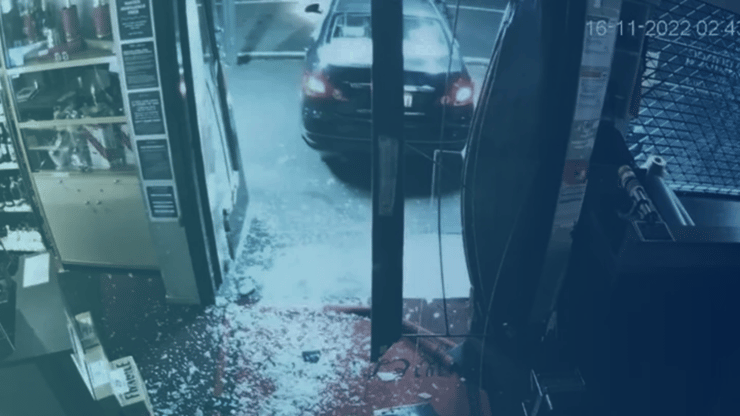Ram Raid Whodunnit: Don’t Ask Police, They Don’t Know

Police have failed to even identify culprits in nearly half of the raim raids reported across New Zealand in the last seven years, new police data shows.
That means robbers behind every second ram raid, on an average, are roaming free with no consequences for their actions, a failure the police are attributing in part to “limited opportunities” to identify culprits.
The Indian Weekender obtained data on every ram raid reported in the country since 2017 under the Official Information Act. Technically speaking, ram raid is not defined as a unique offence in the country’s criminal code.
But for the purpose of our request, the police included all crimes that met all of these three criteria–a burglary or aggravated robbery, it happened at a retail/commercial premise, and text describing the incident in police records mentioned “ram raid”.
A total of 2,186 such ram raids were reported between January 2017 and January 2024. The police couldn’t manage to identify even a single culprit in 1,155 cases, the police data shows.
In the four years to 2020, the total ram raids in any single year were less than 200. But in 2021, that number more than doubled to 410. The year 2022 was the worst of the lot, with 712 ram raids being reported at an average of nearly two incidents every day.
The National Party, which formed a coalition government in 2023, pegged their poll campaign heavily on what it described as the Labour government’s “soft on crime approach” that had exacerbated crime in the country.
Responding to a specific query by The Indian Weekender whether a 50 per cent rate of identifying ram raiders was good enough, a police spokesperson said, “Police has focussed on curbing and preventing ram-raids and there has been a sustained trend of reduction since the peak in late 2022 although we recognise the devastating effect on businesses of any ram-raid.”
The spokesperson pointed out that the police investigate every reported occurrence of ram raid. “However, sometimes we can’t identify the offenders and that means there is no opportunity to take action against those that are responsible.
“We continue with our investigations until we have exhausted all justifiable lines of enquiry. In particular, ram-raid scenes there may be limited opportunities for forensic evidence such as DNA or the CCTV footage may not be of sufficient quality to identify suspects.”
The spokesperson went on to add that of the nearly 50 per cent cases in 2023 where the police did identify culprits, prosecution action was initiated in 89 per cent cases, while the remaining 11 per cent went through non-prosecution pathways–mostly youth referral.
“We know that 80 per cent of ram raids involve young people, sometimes aged 10-13. Prosecution is not the most appropriate response for these young people.
“We want to see if we can turn their lives around and steer them away from offending. That is where youth referral programmes such as Fast Track can be successful in providing support for the young people and their whānau,” the spokesperson said.
The Dairy and Business Owners Group, which represents thousands of dairies and other small businesses across New Zealand, says the government must first acknowledge the emergency if it were to solve the problem meaningfully.
Chairperson Sunny Kaushal says, “The unprecedented levels of retail crime have Kiwi business owners feared for their lives. These businesses are being bashed, robbed, burgled, ramraided and smash-and-grab daily. They were burgled and robbed 18 times a day, and ram-raided every 10 hours.
“The dangerous message this sends to us is that we’re on our own, and last year we’ve seen few retailers take matters into their own hands. All we are asking is for safety of our businesses and communities.”
Police have failed to even identify culprits in nearly half of the raim raids reported across New Zealand in the last seven years, new police data shows.
That means robbers behind every second ram raid, on an average, are roaming free with no consequences for their actions, a failure the police...
Police have failed to even identify culprits in nearly half of the raim raids reported across New Zealand in the last seven years, new police data shows.
That means robbers behind every second ram raid, on an average, are roaming free with no consequences for their actions, a failure the police are attributing in part to “limited opportunities” to identify culprits.
The Indian Weekender obtained data on every ram raid reported in the country since 2017 under the Official Information Act. Technically speaking, ram raid is not defined as a unique offence in the country’s criminal code.
But for the purpose of our request, the police included all crimes that met all of these three criteria–a burglary or aggravated robbery, it happened at a retail/commercial premise, and text describing the incident in police records mentioned “ram raid”.
A total of 2,186 such ram raids were reported between January 2017 and January 2024. The police couldn’t manage to identify even a single culprit in 1,155 cases, the police data shows.
In the four years to 2020, the total ram raids in any single year were less than 200. But in 2021, that number more than doubled to 410. The year 2022 was the worst of the lot, with 712 ram raids being reported at an average of nearly two incidents every day.
The National Party, which formed a coalition government in 2023, pegged their poll campaign heavily on what it described as the Labour government’s “soft on crime approach” that had exacerbated crime in the country.
Responding to a specific query by The Indian Weekender whether a 50 per cent rate of identifying ram raiders was good enough, a police spokesperson said, “Police has focussed on curbing and preventing ram-raids and there has been a sustained trend of reduction since the peak in late 2022 although we recognise the devastating effect on businesses of any ram-raid.”
The spokesperson pointed out that the police investigate every reported occurrence of ram raid. “However, sometimes we can’t identify the offenders and that means there is no opportunity to take action against those that are responsible.
“We continue with our investigations until we have exhausted all justifiable lines of enquiry. In particular, ram-raid scenes there may be limited opportunities for forensic evidence such as DNA or the CCTV footage may not be of sufficient quality to identify suspects.”
The spokesperson went on to add that of the nearly 50 per cent cases in 2023 where the police did identify culprits, prosecution action was initiated in 89 per cent cases, while the remaining 11 per cent went through non-prosecution pathways–mostly youth referral.
“We know that 80 per cent of ram raids involve young people, sometimes aged 10-13. Prosecution is not the most appropriate response for these young people.
“We want to see if we can turn their lives around and steer them away from offending. That is where youth referral programmes such as Fast Track can be successful in providing support for the young people and their whānau,” the spokesperson said.
The Dairy and Business Owners Group, which represents thousands of dairies and other small businesses across New Zealand, says the government must first acknowledge the emergency if it were to solve the problem meaningfully.
Chairperson Sunny Kaushal says, “The unprecedented levels of retail crime have Kiwi business owners feared for their lives. These businesses are being bashed, robbed, burgled, ramraided and smash-and-grab daily. They were burgled and robbed 18 times a day, and ram-raided every 10 hours.
“The dangerous message this sends to us is that we’re on our own, and last year we’ve seen few retailers take matters into their own hands. All we are asking is for safety of our businesses and communities.”









Leave a Comment